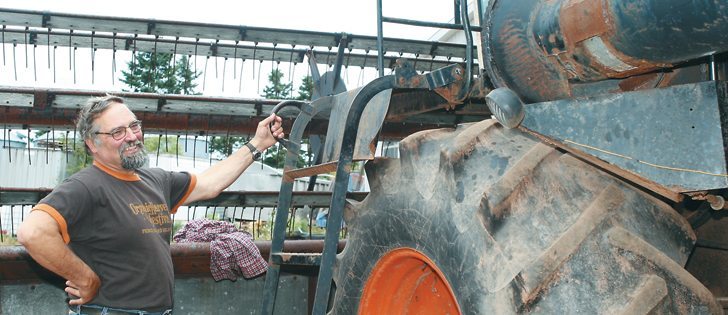Meadowbrook Farms | David Mol is one of four seed growers on Prince Edward Island
CHARLOTTETOWN, P.E.I. — David Mol’s family has grown everything from onions to cattle, but he settled on pedigreed seed on his Prince Edward Island farm.
Meadowbrook Farms has operated since 1962, farming about 1,300 acres in the Charlottetown area.
Mol is one of the few registered seed growers in the province, producing diverse crops for a region where agriculture is a primary industry.
“Thirty years ago there were probably 30 seed growers with their own facilities, retailing it out the door and took care of the neighbours,” Mol said.
Read Also

Europe holds promise for Canadian lentils
Pulse Canada is trying to help boost lentil consumption in Europe, which is already the fourth largest market.
That all changed when products such as hybrid corn arrived because large corporations marketed those crops.
“We are down to four seed growers on the island who are authorized establishments,” he said.
The Mol family moved to Prince Edward Island from Chatham, Ont., where they grew sugar beets, seed oats, barley, tobacco and cattle.
Drought was driving them out of business.
They sold the farm, and during a vacation Mol’s father became enchanted with P.E.I. He bought a farm and started a real estate business in Charlottetown.
Mol had earned a business degree in Michigan and was involved in real estate, but eventually went farming full time.
He grows wheat, fall rye, barley, flax and soybeans as well as 70 acres of organic soybeans and barley on the province’s red sandy loam.
His inventory offers different wheat and barley varieties, including many from Western Canada. Often these western crops are not suited to this region.
For instance, fusarium resistance in the West may not work here because of different strains of the disease. However, few plant breeders are left so there is less chance of getting regional varieties.
He grows a milling wheat variety developed at Charlottetown more than 20 years ago.
“That is the newest variety we are using here, 20-year-old genetics,” he said.
He also grows Mustang oat and barley varieties from Mastin Seeds at Sundre, Alta.
All the seed is cleaned and stored on the farm.
Raccoons are a unique pest problem. He does his best to control them, but they still manage to raid the seed bags.
The bags are stacked in the storage area, and the raccoons chew and burrow through the bottom layers.
“The grain seeps out of one side, the bag loses its integrity and the next thing the top two bags fall over on the ground,” he said.
Pests are just one of his challenges.
They had a late spring this year like many other farmers across Canada, and his crops went into the ground later than normal.
“Weather is the single thing that puts the acid in my stomach, never mind pricing or other things you have to deal with to make business decisions or calculate risk,” he said.
Harvest starts early with barley straight combined by mid-August and the final crops coming off around Thanksgiving.
“We get so much dew that swathing doesn’t work that well. We don’t have the concerns of trying to ripen stuff,” he said.
Farming in a small space is another issue. His fields are scattered throughout the region and tend to be around 15 acres each.
Moving equipment is tricky. There are no shoulders on the narrow roads, and he tries to move equipment in the early morning to avoid traffic.
The widest header on one of his combines is 25 feet because anything bigger is too difficult to move on the roads.
Pesticide use on the island is under scrutiny and some groups are calling for the province to be completely organic.
There have been fish kills, and the potato sector is often blamed for pesticide runoff polluting the water.
Most of his barley is used for feed, but he does grow some organic crops because a group is interested in developing a P.E.I. craft brew industry.
There is no commercial malting business, but the brewers hope to develop a small facility, brew the beer and sell it as a local product.
Besides being a busy farmer, Mol also believes in volunteering.
A past president of the Canadian Seed Growers Association from 2005-2007, he spent 16 years on the board of directors and travelled across Canada many times meeting farmers who faced the same issues in spite of regional differences.
Lobbying was intense and time consuming.
He was away from home 120 days a year while president of the seed growers. He backed away because he did not have enough help to look after the farm.
He is now vice-president of the P.E.I. Federation of Agriculture, which requires 10 to 12 days a year of his time.
“The same people who are the busy go-getters in the farming industry is the same calibre of people you really need to have in these organizations. They are ones who are the most time challenged,” he said.
















